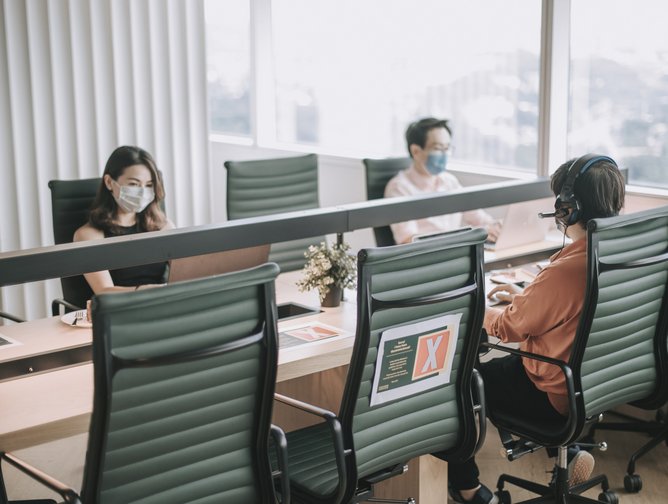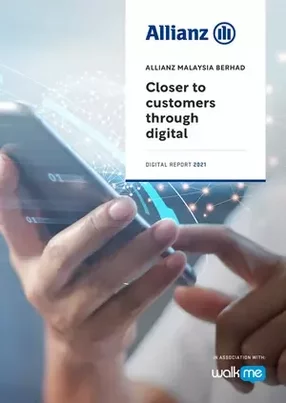There has been much discussion about the insurance industry’s need to embrace digital transformation if it is to survive oncoming challenges from Big Tech competitors. Following the disruptive influence of the COVID-19 pandemic, most would agree that technology is an important part of insurance’s future. However, genuine leaders like Allianz know that it’s only half the story; more than anything, digital is an opportunity for foundational culture changes that can ultimately enrich the insurer-customer relationship like never before.
Yorck Reuber joined Allianz Malaysia as Chief Information Technology Officer in June 2020, during the pandemic’s first major global lockdown. Having built a career by working at some of the most prestigious technology, finance, and insurance-based companies in the world, always in international setups, he moved to Malaysian in 2018. What drew him to change jobs during such uncertain times? The answer is simple: the opportunity to make a difference. “I strongly felt that I wanted to work closer with customers and make a positive impact. Allianz Malaysia provided me with the perfect chance to do just that.”
Holding a degree in Ships Engineering, it's safe to say that Reuber has an expert grasp on the technical aspect of his work. However, when asked what transferable skills he has brought to Allianz, he chooses to emphasise the importance of his approach to leadership and the dedication to “cultural change” that he has cultivated. “As a company, we may buy technology but the real impact is making a genuine change in the way people think and work,” Reuber explains. “My day-to-day role consists of working with the business on product development - determining which insurance offerings we want to bring to the market.” His perspective complements what is now a generally accepted truth regarding digital transformation, namely that it is as much about people as it is about systems or technology.
2020 brought about operational circumstances for insurance that made digital adoption practically essential. In this regard, Reuber states that Allianz Malaysia was generally well-prepared already, although there were still challenges to overcome. “Luckily, there was no paper being carried around the offices by that point, but people were still very ‘paper minded’. The big target was (and continues to be) to use the benefits of digitalisation to speed up processes and to make things simpler.” As such, he and his team oversaw the distribution of laptops to all staff members to ensure business continuity and make working from home fully effective.
Some other challenges are more enduring in Malaysia, not least of which is the country’s highly regulated market. Already long familiar with EU regulatory standards and now immersed in Malaysia’s for over two years, Reuber states that the environment is difficult but not without signs of encouraging development, “To be very clear, regulation has changed a lot since the pandemic, but it serves to protect the business and should ultimately support Allianz Malaysia’s journey.” Another issue is resourcing the IT talent necessary to implement Allianz Malaysia’s broader vision, a gap that the domestic labour market has yet to adequately fill. “You can find all the classic IT skill sets here, but skills like computing on the edge, stuff that really brings digitalisation forward, are lacking.”
Reuber’s description of Allianz Malaysia’s digital roadmap makes it clear why working to resolve the skill issue will be crucial: “The group has been implementing a complex suite of digital tools over the last few years, the IT Master Platform (ITMP). Our priority is to change how we interact with customers by sharing data and scaling within the group, determining what’s working well in other countries and innovating locally to speed things up.” Based on cloud technology, the ITMP is the result of dedicated research on how to streamline operations, increase cost optimisation, and future-proof Allianz Malaysia’s business.
However, cloud isn’t the only technology that is proving particularly important both to the company and insurance generally. “Although there are lots of really smart technologies in the market, I believe what's most relevant for insurance at this moment is RPA (robotic process automation),” says Reuber. Considering the full utilisation of RPA to still be far off, he enthuses the potential for automation tech to transform Allianz Malaysia’s internal processes by eliminating repetitive manual tasks. “Whereas customers would previously have to make a phone call and potentially wait a long time for resolution, simple enquiries could be dealt with using tools like RPA. This is an area in which we have to invest more. Also, using artificial intelligence (AI) to analyse data, we will be able to shape our products in a better way: more personalised value for customers and simplified policy contracts molded to fit a particular purpose.”
The importance of innovation partners
Allianz Malaysia is teaming with various innovative partners to drive its digital adoption.
Using a Digital Adoption Platform (DAP), the company supports users to effortlessly navigate complex software, websites, and apps. By supplementing proactive and comprehensive guidance for customers, these tools can ensure that any problems can be resolved easily in-situ.
“Having a partner that is able to help bridge the knowledge gap when using digital tools in areas that you haven't previously been exploring is really key,” states Reuber. He notes that innovation partners have been particularly helpful during the roll out of automation tech like activitybots at Allianz.
“As an insurance business, our target is not to use technology to keep people away from interacting with us. We simply want to take care of any issues they have in the fastest and easiest way possible.
“Digital adoption is difficult and complex, but it doesn’t need to be anymore when there are tools in the market that can do that work in the background. That's the magic of these partnerships,” he said.
Cybersecurity is an aspect of Allianz’s operations which has always been given high priority. “The only thing we sell is trust. So, if we can't secure the data of our customers, why should they buy from us?” With incidences of cyber criminal activity tangibly on the rise, Allianz continues to place paramount importance on security while also exploring methods for accelerating speed-to-market. “Again, automation technologies are very important with regards to security. Before, we tended to just lock things down and subsequently make things even more complicated. Now, things have to be easy yet secure to access, and it’s only by using new technologies that both those aims are achievable.”
For Reuber, the decision to embrace digital adoption goes beyond mere operational optimisation and actually represents an existential requirement for Allianz’s continuity. “The companies that don't adopt digital will soon not be in the market anymore,” he cautions. “Startups competent in data analytics are already starting to sell insurance.” The move, then, demonstrates that Allianz is preparing to become more like a tech company that primarily operates within insurance (as opposed to the opposite). In addition to enhanced relevancy to its customers’ lives, Reuber adds that Allianz will always retain the quality that has ensured its success since 1890, “Our slogan remains, ‘We secure your future.’” This message is being adapted to meet the requirements of the digital era, he reasons, and that is why the company continually reexamines its priorities.
Therefore, as Allianz continues on its transformation journey, Reuber is determined to instill the digital mentality in its employees as the company pushes for further growth and superior market performance. “Digital is the future,” he poignantly concludes. “It's more than just buying hardware or software; it's changing the way people think and the way we cooperate with each other. At the end of the day, it's enabling Allianz to do things faster and to be much closer to our customers.”


